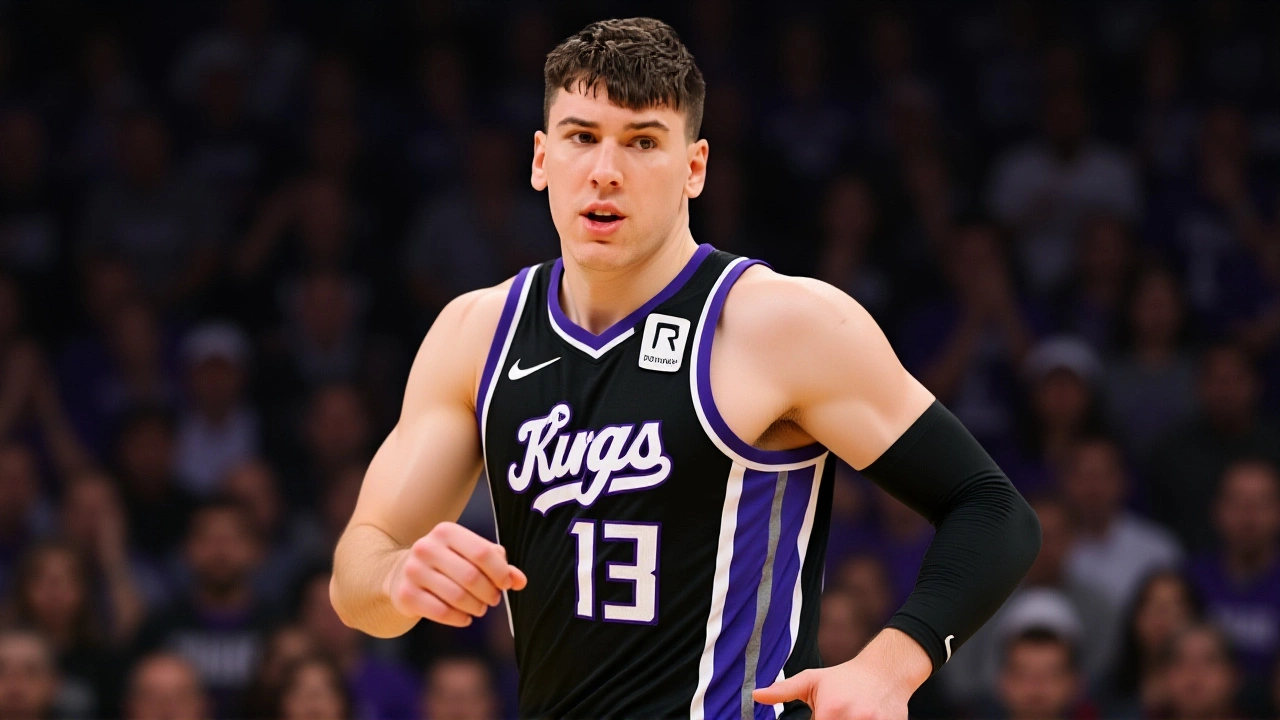When Domantas Sabonis, center for the Sacramento Kings snatched an offensive rebound and jammed it home with six seconds left, the crowd at the Golden 1 Center erupted. The Kings edged the Utah Jazz 105‑104 on Friday, October 24, 2025, in a nail‑biting start to the 2025‑26 NBA season. The win mattered because it gave Sacramento a home‑court advantage right out of the gate, while the Jazz walked away with a bruising lesson in closing games.
Season Opener Overview
The matchup, officially logged as Kings vs. JazzGolden 1 Center, Sacramento, California, featured two teams still shaping their identities. Sacramento, led by head coach Mike Brown, entered the night hoping to showcase a balanced attack. Utah, under Will Hardy, was eager to prove its defensive mettle after an off‑season shuffle.
From the tip‑off, the game felt like a chess match. The Jazz leaned on their starters—Lauri Markkanen, Zach LaVine, Russell Westbrook and rookie Keyonte George—to set the tone. Sacramento’s answer came from veteran guard De'Aaron Fox, who kept the Kings within striking distance with timely three‑pointers.
Key Moments and Clutch Play
Midway through the third quarter, the Jazz built a seven‑point lead thanks to a back‑to‑back surge from Markkanen and LaVine. The Kings answered with a 12‑0 run, sparked by a ferocious block from Myles Turner that ignited the home crowd.
But the real drama unfolded in the final minute. With the score tied at 104, Utah’s Keyonte George drove to the rim, only to see Sabonis crash the boards. The rebound set up a quick outlet to Fox, who drained a contested three to give Sacramento a 105‑104 edge.
Six seconds later, Sabonis planted the ball for what would become the game‑winner. The play was a textbook offensive putback: he boxed out a Jazz defender, gathered the loose ball, turned, and slammed it home as the buzzer approached. Even the arena’s replay crew was startled enough to replay the sequence twice.
Statistical Breakdown
- King’s paint points: 36 – a modest total that underscores their reliance on perimeter shooting.
- Jazz fast‑break points: 6 – reflecting a disciplined, though sometimes sluggish, transition defense.
- Rebounds: Sabonis led with 12, while the Jazz’s top rebounder, Richaun Holmes, pulled down 9.
- Turnovers: Sacramento committed 14, Utah 11, illustrating a tightly contested ball‑handling battle.
- Three‑point shooting: Fox (5‑of‑11), LaVine (4‑of‑9), Markkanen (3‑of‑8).
Beyond the numbers, the game’s defensive intensity was evident in the low fast‑break tally. According to David Locke of the Locked On Jazz podcast, the Jazz’s “gritty defensive identity” forced the Kings into half‑court sets more often than either team expected.
Reactions from Players and Analysts
Post‑game, Sabonis was quick to credit his teammates: “We trusted each other on that last play. I just did what I had to do,” he told the press. Fox added, “That putback was the spark we needed; we fought for every point.”
On the other sideline, Jazz veteran Ron Boone—now a broadcaster—lamented the bench’s performance. “The starters did their job, but the bench didn’t give us the cushion we needed,” he noted on the Locked On Jazz show.
Analyst Mike Gminski of ESPN highlighted the “size advantage” the Kings exploited inside the paint, despite the modest 36 points there. He predicted that if Sacramento continues to feed the post, they could become a late‑season contender.
Implications for the Rest of the Schedule
For the Jazz, the loss sets a tone for a road‑heavy stretch. They head to Phoenix on Monday, October 27, then to Portland on Wednesday, October 29. The Suns, fresh off a 112‑85 rout of the Clippers, present a tough test. The Jazz’s defensive focus will be key, but they’ll need more scoring punch from the bench to survive the upcoming grind.
The Kings, meanwhile, have a two‑week home stretch beginning with a showdown against the Los Angeles Clippers on November 2. If they can keep Sabonis and Fox healthy, and continue to capitalize on second‑chance points, Sacramento could solidify itself as a West‑coast playoff contender.
Both franchises also feel the ripple of the League’s new scheduling rule, which shortens travel windows to curb fatigue. That rule could benefit Sacramento’s relatively compact early-season itinerary, while the Jazz’s back‑to‑back road games might test their depth.
Key Takeaways
- Sabonis’ clutch putback turned a close contest into a victory for the Kings.
- The Jazz’s defensive identity shone, but bench production lagged.
- Statistically, the game was a low‑fast‑break affair, underscoring half‑court execution.
- Both teams face challenging road trips that could define their early‑season trajectories.
Frequently Asked Questions
How does Sabonis' game‑winning play affect the Kings' standings?
The victory lifts Sacramento to a 1‑0 record, giving them an early edge in the Western Conference. A win at home also provides a morale boost that could translate into better performance during the upcoming stretch of home games.
What were the main reasons the Jazz fell short?
Aside from missing key contributions from the bench, Utah struggled to convert in the paint, scoring only six fast‑break points. Their defense held up, but offensive inefficiency in the final minute cost them the game.
Who stood out for the Kings besides Sabonis?
De'Aaron Fox paced the offense with 23 points and several clutch three‑pointers. Myles Turner’s block and Jordan Poole’s energy off the bench also drew praise from the coaching staff.
What does the upcoming road trip mean for the Jazz?
Facing the Phoenix Suns and Portland Trail Blazers on consecutive nights will test Utah’s depth. If they can maintain their defensive intensity and generate more offense from role players, they could bounce back and stay competitive in the Western Conference.
How might the new NBA scheduling rule influence both teams?
The rule shortens travel windows, which benefits Sacramento’s early home stand by reducing fatigue. Conversely, the Jazz’s immediate back‑to‑back road games could expose any lingering depth issues, making bench contributions even more crucial.

Written by Maxwell Kingsdale
View all posts by: Maxwell Kingsdale